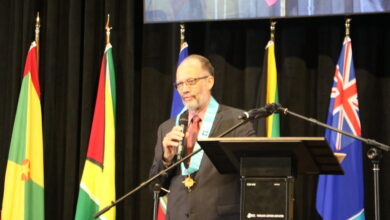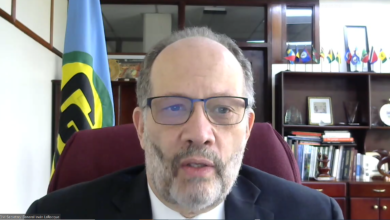(CARICOM Secretariat, Turkeyen, Greater Georgetown, Guyana) As Secretary-General of CARICOM, it is with great pleasure that I receive today your Letters of Credence, accrediting you as the new Plenipotentiary Representative of the European Union (EU), one of the most valuable International Development Partners of the Caribbean Community.
Since its inception, the Caribbean Community has enjoyed a distinct relationship with your Region. Despite the changes faced throughout the years in the world arena and in our respective regions, this relationship has constantly expanded and developed based on the spirit of partnership and shared interests. This has been reflected in the context of four consecutive versions of the Lomé Convention since 1975, and from the year 2000 within the framework of the Cotonou Agreement.
Ambassador, one of the most significant values that both our regions share is the strong conviction that regional integration remains the best way to secure prosperity for our people. The European Union for more than five decades has been at the forefront of regional integration experiences and constitutes an important model for other regions around the world in that area. Likewise, the Caribbean Community constitutes the longest surviving integration movements among developing countries and has been moving at its own pace and determination in order to achieve its goals.
However, as we are all aware, the process of regional integration is usually fraught with challenges and each integration process is characterised by its peculiar circumstances.
The valued support provided by the EU has materialized in many forms, but mainly by way of the development cooperation allocated in the European Development Funds (EDF) to provide support for regional integration and cooperation taking into account the objectives, needs, priorities and specificities of the integration process in the Region. These Funds have been channeled through the framework of the various Caribbean Regional Indicative Programmes and have been a significant complement to the development cooperation provided to each of our Member States through their respective National Indicative Programmes.
Currently the Caribbean Regional Strategy Paper and the Caribbean Regional Indicative Programme (CRIP) are being financed through the 10th EDF with an allocation of €165 million over the period 2008-2013. The Caribbean has secured, at the end of 2011, commitment of 80% of all the resources allocated under the CRIP. This constituted the highest level of commitment of all Regional Indicative Programmes of the 10th EDF among ACP Regions. This achievement has only been possible thanks to the joint efforts and the permanent collaboration between our Secretariat and the EU Delegations in Guyana and Barbados.
Excellency, in the area of trade, the EU has also historically been an important market for Caribbean products. This has been primarily due to the provisions of non reciprocal trade regimes for goods and more recently within the framework of the Economic Partnership Agreement (EPA), which extend our preferential trade relation to include services and investment as well. Today, the Caribbean region remains the only ACP region that has successfully negotiated, concluded and signed an EPA.
While we recognise the potential of the EPA and the commitment of the Region to move forward in this context, we also have to take into consideration that its implementation poses a significant challenge for some of the countries in our Region, given their financial and technical resource limitations. We also have to take into consideration that the particular trade context of the Region, with the special cases of The Bahamas and Haiti and the Dominican Republic, makes the process of implementation even more challenging. In that regard, our challenge is to address in an efficient manner the constraints and limitations in order to translate the implementation of the EPA into concrete results for the benefit and the welfare of the people of the Region.
In a world of accelerated and systemic change, the political dialogue between our regions has also become a very important part of our relationship through which we can jointly address the challenges and seize the opportunities created by these changes. In that regard, as a demonstration of the importance that we place on the relationship with the European Union, shortly after my assumption of office as the Secretary-General of CARICOM and CARIFORUM, we mounted a mission to Brussels. This was in order to engage with high-level EU representatives in discussions on critical issues of our partnership and also to have the opportunity to describe the changes of the integration process of CARICOM and provide a better understanding of this process which is not often understood externally.
Soon thereafter within the margins of the Commonwealth Summit held in Perth, Australia, Foreign Ministers of the Caribbean Community met with Her Excellency Baroness Catherine Ashton, High Representative of the European Union for Foreign Affairs and Security Policy.
Ambassador, for us in CARICOM, the political and diplomatic dimension of our relations with the European Union is of equal importance to development co-operation. I cannot emphasise this enough as we seek to strengthen all aspects of our relations. We therefore look forward to continued engagement at the highest political and diplomatic levels on issues of mutual interest to our two regions.
Your Excellency, you arrive at a very interesting moment for the Caribbean-EU relationship. We welcome the proposal of the EU to convene, as part of the work agenda, a political dialogue with the Caribbean at Senior Officials level, leading to the adoption and subsequent implementation of the Joint EU-Caribbean Strategy which will provide the framework for cooperation beyond the current financial cooperation cycle. This will also provide an opportunity to discuss matters of concern such as the proposed new EU Development Policy and start the discussions on the post-Cotonou relationship. We hope that that meeting could take place during the first quarter of this year.
In the political arena, we are looking forward to participating in the upcoming EU-LAC summit later this year. The Caribbean maintains a strong interest in having vibrant and significant participation in that Forum. However, we look forward to discussing the mechanisms within a context that guarantees that the interests of the Caribbean have a relevant and substantial place in these discussions.
Ambassador, as you can see, there is a substantial and dynamic agenda ahead of us. In this context, the joint efforts and mutual collaboration between the EU Delegation and our Secretariat will continue to play a pivotal role in further consolidating the partnership between our two regions. I am confident that you share that goal with us. I, along with the staff of the Secretariat, therefore look forward to working and collaborating with you and your team to enhance the long, friendly and productive partnership for the benefit of our people. It is my distinct pleasure to accept the letters accrediting you as Plenipotentiary Representative of the European Union to the Caribbean Community. I extend to you a warm and special welcome to our Region and wish you a very successful tour of duty.
I thank you.




